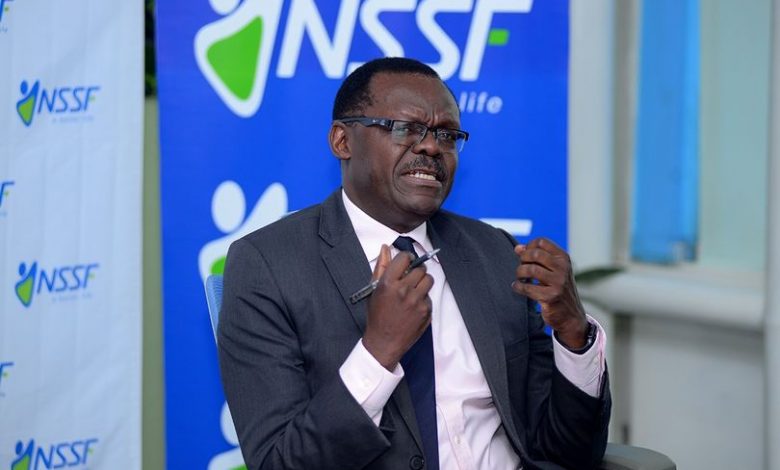Why NSSF board has refused to resign
A parliamentary committee investigating the mismanagement of NSSF recommended that the labour minister and Fund’s board and top management resigns immediately.

The National Social Security Fund (NSSF) Ag Managing Director, Patrick Michael Ayota, has confirmed that he, along with the board of directors managing the Fund, are not willing to step aside as recommended by the committee of parliament.
According to Ayota, the report from the select committee of parliament is advisory, hence it has to go to the executive which assesses the merit of what has been recommended, and then whatever the executive decides, it’s what will be implemented, however, the fund has to continue running.
“You asked the minister to resign, you want the board to step aside, you want top management to step aside, and now what happens to the fund?” Ayota wondered while addressing a press conference at the Fund’s headquarters in Kampala.
“The point of it anyway is that until the executive pronounces itself in terms of the recommendations, we shall still stay serving until we see,” he noted.
Following the assessment of the Fund’s investment philosophy, Ayota said the select committee of parliament did not analyze the Fund’s investment performance in terms of the entire portfolio; however, it only considered the performance of one investment.
He explained that whereas they appreciate the committee’s efforts in their investigations into the mismanagement at the Fund, it appears to be that the committee did not utilize all the necessary information while assessing their work.
“An analysis of the Fund’s investment portfolio over the last 12 years shows consistent growth of the assets and competitive growth,” he said.
“In the case of Uganda Clays, which is listed on the Uganda Securities Exchange, NSSF is a major shareholder. In 2011, the Fund advanced a loan of UGX11billion to Uganda Clays to help it expand operations in eastern Uganda,” he explained.
Since advancing that loan to Uganda Clays, Ayota noted that the company now contributes more than UGX 1.5bn a year to NSSF hence their action as NSSF helped save more than 1,000 jobs and the 33% equity NSSF had made into Uganda Clays.
Additionally, Ayota further noted that the committee appears not to have considered the facts they provided to them, such as the onboarding of geo-mapping technology, to help the fund easily trace the locations of all employers.
“We clearly explained to the committee that our geo-mapping exercise was successful even after the contract with the provider expired. With the transfer of knowledge to our staff, the fund was able to conclude the exercise and map all the employers. It is now fully operational and there is value for money,” he added.
In his remarks at the same press conference, the chairman board of directors Dr Peter Kimbowa highlighted that they find the report devoid of important context and contains inaccuracies, especially regarding investments.
He cited that out of 210 investments run by the Fund, only one known as West Nile Golf Club Investment lost value.
“In our opinion, the fact that the committee had to go back almost two decades to find one investment that has lost value shows that the Fund has had a stellar performance over the years,” he added.
Regarding the committee report about the alleged UGX6 billion that was disbursed to the ministry of gender, Kimbowa said the money was never disbursed nor was the UGX1.8b also shared among the board members.
He confirmed that the money is still at the Fund and that work plans that were set up for it had not been approved by the board.
At the beginning of this month, the chairperson of the select committee on the state of affairs at the National Social Security Fund (NSSF), Mwine Mpaka, presented a report which recommended the resignation of the labour minister Betty Amongi and NSSF ex-Managing Director Richard Byarugaba alongside his successor Patrick Ayota.
The committee also asked the NSSF Board led by Peter Kimbowa to be immediately disbanded and replaced.
However, Mpaka’s report hasn’t been approved by the executive.







